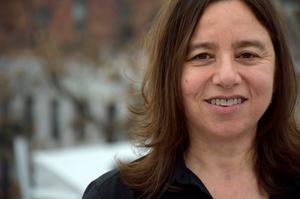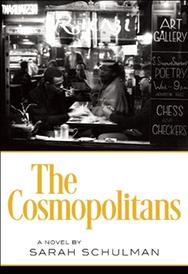
|
|
| photo: Drew Stevens | |
Sarah Schulman is a novelist, playwright, screenwriter, nonfiction writer, AIDS historian and journalist. She is Distinguished Professor of the Humanities at the City University of New York, College of Staten Island, a fellow at the New York Institute for the Humanities at New York University, on the advisory board of Jewish Voice for Peace and faculty adviser to Students for Justice in Palestine. Schulman is co-founder of the ACT UP Oral History Project and MIX:NY Queer Experimental Film Festival. The Cosmopolitans (The Feminist Press, March 15, 2016) is her 10th novel, and 17th book.
On your nightstand now:
Queer Activism in India: A Story in the Anthropology of Ethics by Naisargi Dave; Voyage of the Sable Venus and Other Poems by Robin Coste Lewis; Ma Mère Rit by Chantal Akerman; Nochita by Dia Felix; The Odd Woman and the City by Vivian Gornick; and Agnes Martin: Her Life and Art by Nancy Princenthal.
Favorite book when you were a child:
Goodnight Moon by Margaret Wise Brown, Harriet the Spy by Louise Fitzhugh, The Pushcart War by Jean Merrill, The Diary of a Young Girl by Anne Frank.
I think the important influences here come from the learned knowledge that girls could be writers, that urban life was a reasonable subject for literature and that there is a beauty in repetition. Goodnight, moon. Goodnight, red balloon.
Your top five authors:
Carson McCullers--I have spent most of my adult life thinking about Carson McCullers. In 2002, I had a play produced at Playwrights Horizons, "Carson McCullers," and have since written a film, "Lonely Hunter," and am now working on a novel in which she appears. I have read everything she has written that I could get my hands on, including juvenilia, and most of what has been written about her. The mystery and allure of McCullers is how a young white woman from segregated Georgia, could--at age 23--publish a book that Richard Wright could call the first book by a white writer with fully realized Black characters. She had an incredible ability to inhabit any kind of person: a Filipino gay man, a dwarf, a Jewish gay deaf mute. How did she do it? The question is a mesmerizing one.
Jean Genet was the first writer on romance that I believed. I was handed his book Funeral Rites in high school by a girl who said "Here, you're a romantic," and have been compelled towards his work ever since. My most recent investigation was a piece called "Jean Genet in Palestine," which will appear in a new anthology honoring Edmund White.
Rabih Alameddine is the most exciting novelist in my life. His first novel Koolaids: The Art of War, which juxtaposes the AIDS crisis with the Lebanese Civil War, is one of the most successful AIDS novels to date. The formal breaks artfully replicate the emotionality of that period and that context.
Claudia Rankine, of course, is a writer who has the community's trust.
And I read and am enriched by all my friends who inspire me. Book you're an evangelist for:
Book you're an evangelist for:
I, The Divine by Rabih Alameddine. Anyone who wants to be a better writer should read this book.
Book you've bought for the cover:
Tripmaster Monkey: His Fake Book by Maxine Hong Kingston, and I loved it.
Book that changed your life:
Most recent book to change my life is John Keene's Counternarratives. It is a masterful work, 20 years in the making, that reveals the inability of conventional narrative structure to contain the individual and collective experience of slavery over time and place.
Favorite line from a book:
"It happened that green and crazy summer." --from The Member of the Wedding by Carson McCullers.
Five books you'll never part with:
Funeral Rites by Jean Genet, The Ballad of the Sad Café by Carson McCullers, Citizen: An American Lyric by Claudia Rankine, Visions of Cody by Jack Kerouac and "The Transformation of Silence into Language and Action" by Audre Lorde.
Book you most want to read again for the first time:
Wide Sargasso Sea by Jean Rhys. This author wrote four novels in the 1920s, then drank for some decades, only to produce her great work in the 1960s, when many readers thought she was dead. I want to understand that surprise of holding a story as long as one can, until it lives on its own.
Not-yet-published books that you are looking forward to:
Because I live in the world of writers, I often know what my favorites are working on long before the books are published or even fully written. In the near and long future, I am looking forward to: Tracie Morris's forthcoming experimental dialogues with five artists, Rabih's book about AIDS and Tayari Jones's new novel imagining real autonomy for black women, which are still being written. I am holding a place in my heart for many nonfiction books: the long awaited in-progress biographies of Lorraine Hansberry, Kathy Acker and Muriel Rukeyser; Matt Brim's Poor Queer Theory, which is half written. Far in the future: Nan Alamilla Boyd's History of Tourism in San Francisco and Susan Stryker's Transgender History. Anything from Claudia Rankine and Martha Hodes. Plus all my students everywhere and the life-changing books I have yet to imagine.

